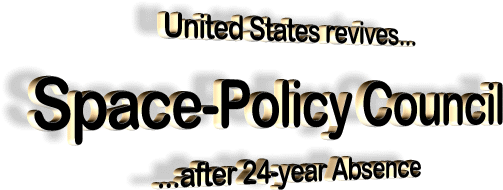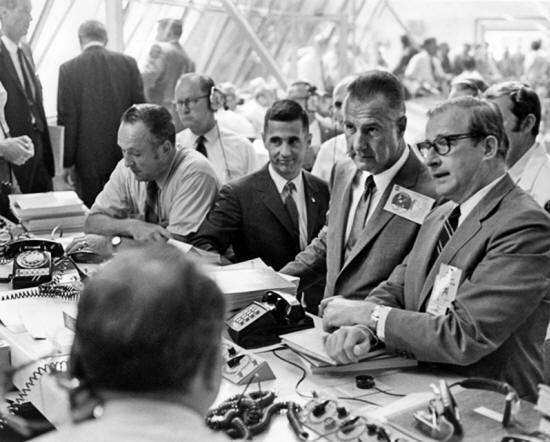|

by Alexandra Witze
07 June 2017
from
Nature Website

Astronaut William Anders (second from left)
awaits
the launch of Apollo 11 in 1969
with
vice-president Spiro Agnew (second from right)
and
NASA administrator Thomas Paine (far right).
U.S. vice-president
to head group overseeing
civilian and military space
activities.
The United States will revive the long-dormant
National Space Council, a group
meant to coordinate space policy among government agencies and
departments.
Vice-president Mike
Pence, who will chair the council, announced
its reinstatement on 7 June at
NASA's Johnson Space Center in Houston, Texas.
First constituted in 1958, the space council - or some iteration of
it - has been active sporadically, most recently between 1989 and
1993. Since then, space policy has been mainly run out of the
White House Office of Science and Technology Policy (OSTP) and
NASA.
Re-starting the council will better coordinate the country's space
endeavors, Pence said.
"President Trump
recognizes America needs a coherent and cohesive approach," he
added.
The council,
"will make sure
America never again loses our lead in space exploration,
innovation and technology".
In theory, the National
Space Council oversees US space policy at NASA and defence,
intelligence and commerce agencies.
In practice, however, it
sometimes has had little power to change entrenched practices among
various agencies - particularly in military affairs.
"As long as Trump has
Pence's back, and Pence decides to place a lot of emphasis on
his role as chair of the space council, it has a potential to
make a difference," says John Logsdon, a space-policy expert at
George Washington University (GWU) in Washington DC.
In its 1989-1993
incarnation, the council played a major part in developing
then-president George H. W. Bush's plans to send astronauts to the
Moon and Mars.
It also worked on space
issues with Russia after the collapse of the Soviet Union.
A full plate
The reinstated council will be successful if it coordinates the
government's work with that of the burgeoning commercial space
industry, says Logsdon.
Private companies
currently have a contract with NASA to ferry cargo up and down to
the International Space Station,
and will soon transport US astronauts. A council could strengthen
commercial space connections outside of NASA.
The council could also better coordinate diplomatic relationships
with other space-faring countries, John Logsdon says.
"There's a full plate
there to be eaten," he says.
Whether US space agencies
will get adequate funding to carry out such efforts is unclear.
Speaking at Johnson Space
Center, Pence said that,
"NASA will have the
resources and supports you need to continue to make history".
But the White House has
proposed trimming the agency's US$19.7-billion budget by roughly 3%
for the next fiscal year to $19.1 billion, a relatively moderate
reduction compared with the double-digit cuts outlined for other
science agencies.
Scott Pace, the head of the Space Policy Institute at
GWU, is widely expected to be named as head of the space council's
staff. Pace's extensive government experience includes roles at NASA
and OSTP during the administration of
George W. Bush.
Waiting on the
White House
Trump has
said little about NASA other than
to reiterate themes of American leadership in space, and to joke
about recycled urine during a conversation in April with Peggy
Whitson, then the commander of the International Space Station.
Pence hinted in March
that the council would be resurrected. Space-policy advisors to the
Trump-Pence campaign argued for its reinstatement last October,
before Trump won the presidency.
The new administration has yet to put its stamp on the agency.
Trump has not named a new
NASA chief. Although the agency continues to develop a heavy-lift
rocket and crew capsule to take astronauts to deep space,
the 'Journey to Mars'
that was pushed during the presidency of
Barack Obama is no longer
ascendant.
It remains unclear whether Trump's White House will work to send
astronauts back to
the Moon, on to
Mars or to some other deep-space destination.
(NASA has abandoned
Obama's plan to bring an asteroid to orbit near the Moon and send
astronauts to visit it there.)
Pence made the space-council announcement at an event to introduce
NASA's 12 new astronaut candidates.
They include scientists
such as,
-
Jessica Watkins,
a geologist at the California Institute of Technology in
Pasadena who works on Mars rovers
-
Zena Cardman, a
geobiologist at Pennsylvania State University in University
Park
|


